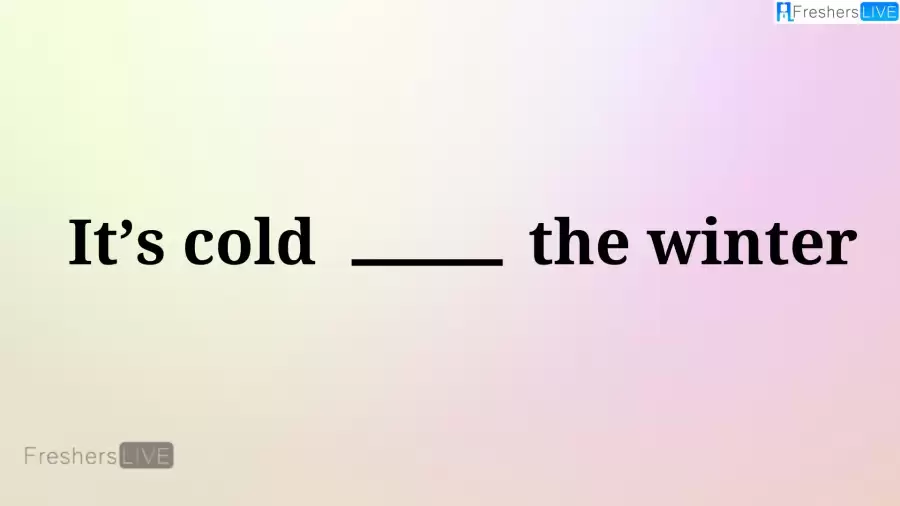Test Your English Grammar With Just Five Questions in This Puzzle
by T Santhosh
Updated Sep 29, 2023

Test Your English Grammar With Just Five Questions in This Puzzle
Let's talk about grammar puzzles. These puzzles make you use your grammar skills and creative thinking. They keep your mind active and might even help you feel less stressed. There are different grammar challenges to try, including the ones we'll talk about soon.
This challenge can be a bit tricky and is great for people who are really good at grammar and pay attention to details. When you become really good at these puzzles, it's not just about having fun – it teaches you skills that can be helpful in many parts of your life. Even though the puzzle might seem hard at first, your goal is to find a solution that follows the grammar rules exactly and reveals the secrets of the puzzle. In the next section, we'll explain this grammar puzzle in detail and show you how to solve it.
Unleash your inner genius with our assortment of puzzles, and Brain Teaser on Fresherslive, carefully crafted to test your wits and creativity. Ignite your imagination and engage your intellect with these puzzles.
1. It's cold ____ the winter
The word "in" is used in the sentence "It's cold in the winter" to show when something happens or to specify a particular time or season. In this case, it's telling us that the cold temperature occurs during the season called "winter." In English, we use prepositions like "in" to connect a noun (in this case, "winter") with other words in the sentence. These prepositions help provide more information about the location, time, or relationship between things. So, when you say "It's cold in the winter," you're saying that during the season of winter, the weather is cold. "In" is the grammar rule we use to talk about specific times or periods, like seasons.

2. ____ it really work?
The word "does" is used in the sentence "Does it really work?" to form a question in English. Specifically, it is part of what's called the "auxiliary verb" or "helping verb" used to create questions in the present simple tense. In this case, "does" is used because it's a question in the present tense. By using "does" at the beginning of the question, it signals that you are asking whether something is true or whether an action is happening.

3. ____ your friends here?
The word "are" is used in the sentence "Are your friends here?" to form a question in English. Specifically, it is part of what's called the "auxiliary verb" or "helping verb" used to create questions in the present simple tense. In this case, "are" is used because it's a question in the present tense, and the subject of the sentence is plural (your friends). By using "are" at the beginning of the question, it signals that you are asking about the presence or location of your friends. It's a common way to form questions in English, especially when you're seeking information or confirmation.

4. We ____ joking
In this case, "aren't" is used to negate the idea that the speaker and others are joking. Specifically, "aren't" is a contraction of "are not," and it's used to indicate that something is not happening or is not true. It tells us that they are not joking; they are being serious. So, when you say, "We aren't joking," you are making it clear that there's no humor involved; instead, you're being serious. "Aren't" helps convey this negation or denial in the sentence.

5. How interested ____ you?
The word "were" is used in the sentence "How interested were you?" as part of a question in the past tense. In this case, it's used to inquire about the degree or level of someone's interest in the past. By using "were" in the question, it indicates that the speaker is asking about the level of interest someone had in the past. So, when you ask, "How interested were you?" you're inquiring about how much interest someone had in something in the past.

Solve the Equation 144 ÷ 12 + 8 x 3 - 12 ÷ 2=?
To determine the answer, apply the order of operations. Begin with the divisions and multiplications from left to right: 144 ÷ 12 equals 12, and 12 ÷ 2 equals 6. Now the equation becomes 12 + 8 x 3 - 6. Next, perform the multiplications and additions/subtractions from left to right: 8 x 3 equals 24, and 12 + 24 equals 36. Therefore, the solution is 36.
Determine the Value of 168 ÷ 7 + 5 x 4 - 16 ÷ 4=?
Stick to the order of operations as usual. Start with the divisions and multiplications from left to right: 168 ÷ 7 equals 24, and 16 ÷ 4 equals 4. Now the equation becomes 24 + 5 x 4 - 4. Next, perform the multiplications and additions/subtractions from left to right: 5 x 4 equals 20, and 24 + 20 equals 44. Thus, the solution is 44.
Test Your English Grammar With Just Five Questions in This Puzzle FAQs
Grammar puzzles are challenges that test your understanding of grammar rules through word or sentence manipulation.







